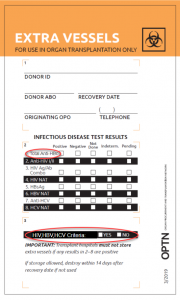Audience: (Please share this notice with anyone in your organization who might need to know it.)
- Transplant hospital coordinators, administrators, and directors who:
- Use the DonorNet MobileSM application for organ offer review
- Evaluate the TransNetSM extra vessels label on accepted organs
- Evaluate the OPTN internal labels for extra vessels
- Update and validate the transplant recipient registration form (TRR) and transplant recipient follow-up form (TRF) in TIEDI® for all organs
- Organ procurement organization (OPO) coordinators, administrators, and directors who use the:
- DonorNet Mobile application for organ offer management
- TransNet extra vessels labels for post-recovery vessel labelling
- OPTN internal labels for extra vessels
- Infectious diseases section of the UNetSM donor record
- People who order and maintain stock of the OPTN internal labels for extra vessels for deceased and living donors.
Implementation date
March 1, 2021
At-a-glance
Organ Procurement and Transplantation Network policy will soon align with the updated U.S. Public Health Service guidelines regarding donor screening for bloodborne disease transmission.
In accordance with the new guidelines, OPTN internal labels for extra vessels, TransNet extra vessels labels and the DonorNet Mobile application will no longer use the “PHS Increased Risk” identification. The labels will still display the donors’ risk for HIV, hepatitis B (HBV), and hepatitis C transmission.
Changes related to the policy alignment include:
- Previously, transplant coordinators were responsible for completing the viral detection section of the six month TRF only for recipients who received an organ from a donor who was deemed “PHS Increased Risk.” With the change in policy, the viral detection section will need to be completed for all recipients.
- Previously, a viral detection section was included in the one year TRF for recipients who received an organ from a donor who was deemed “PHS Increased Risk.” With the change in policy, the viral detection section will only require an HBV nucleic acid test for liver recipients on the one year TRF.
- Previously, “anti-HBc” was used as a field label for HBV core antibody testing. With the change in policy, the label will read “total anti-HBc”, indicating this testing includes both IgG and IgM. This change will be present in all systems, including UNet, TransNet, DonorNet Mobile, and OPTN internal labels for extra vessels.
What you need to do
The updates to the TransNet extra vessels label and DonorNet Mobile donor record will be implemented late in the first quarter of 2021. TransNet users will need to download the new version of the application on the implementation date in order to use the new required extra vessels labels. Further instructions for downloading the new version of TransNet will be provided to users by Feb. 1, 2021. No actions will be required of members to view the DonorNet Mobile changes.
No actions will be required of members to view the viral detection changes in the TRF in TIEDI, but members who are responsible for completing that form will need to begin completing the viral detection section in compliance with policy beginning late in the first quarter of 2021. No actions will be required of members to view the label update for “total anti-HBc” within UNet.
Any transplant hospital or OPO that uses the OPTN internal labels for extra vessels from the OPTN online store will need to procure the updated labels. The new labels will be available on the store site by Jan. 25, 2021 and will be required for use upon the March 1, 2021 implementation date. They may not be used prior to the implementation date.
A small batch of labels will be sent to organizations that have previously ordered labels from the OPTN online store by the end of January 2021.
Additional information
Previously, the OPTN did not collect data on the HBV vaccination status of an organ recipient. With the change in policy, the OPTN Ad Hoc Disease Transmission Advisory Committee is proposing to the Office of Management and Budget a requirement that members must report the HBV vaccination status for all recipients prior to organ transplant on the TRR. If approved, UNOS will provide an implementation date and more details on what members will need to do to comply with the change.
Education and resources
- Two educational offerings will be posted to UNOS Connect on Jan. 28:
- SFT127: PHS Guidelines in OPTN Policy
- SFT128: Talking About Risk Criteria for Disease Transmission
- OPTN policy notice: Align OPTN Policy with US Public Health Service Guideline, 2020
- 2020 PHS Guideline
- Crosswalk between 2013 and 2020 PHS Guideline and OPTN policies
- Briefing to the OPTN Board of Directors
Questions?
If you have questions relating to implementation, contact UNOS Customer Service at [email protected], or call 800-978-4334 from 8 a.m. to 7 p.m. EST.
For policy-related questions, contact [email protected].


